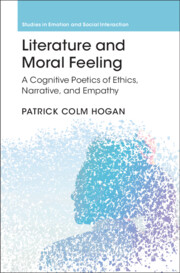Book contents
- Literature and Moral Feeling
- Studies in Emotion and Social Interaction
- Literature and Moral Feeling
- Copyright page
- Dedication
- Contents
- Figures
- Acknowledgments
- Introduction:
- Chapter 1 Defining Ethics
- Chapter 2 The Implied Ethics of Julius Caesar
- Chapter 3 Narrative Universals, Emotion, and Ethics
- Chapter 4 Ethics and Narrative Genre:
- Chapter 5 Emotion and Empathy
- Chapter 6 The Dynamics of Empathic Response:
- Chapter 7 Evaluating Empathy
- Chapter 8 The Critical Empathy of Angels in America
- Afterword:
- References
- Index
- Studies in Emotion and Social Interaction
Chapter 1 - Defining Ethics
Published online by Cambridge University Press: 21 April 2022
- Literature and Moral Feeling
- Studies in Emotion and Social Interaction
- Literature and Moral Feeling
- Copyright page
- Dedication
- Contents
- Figures
- Acknowledgments
- Introduction:
- Chapter 1 Defining Ethics
- Chapter 2 The Implied Ethics of Julius Caesar
- Chapter 3 Narrative Universals, Emotion, and Ethics
- Chapter 4 Ethics and Narrative Genre:
- Chapter 5 Emotion and Empathy
- Chapter 6 The Dynamics of Empathic Response:
- Chapter 7 Evaluating Empathy
- Chapter 8 The Critical Empathy of Angels in America
- Afterword:
- References
- Index
- Studies in Emotion and Social Interaction
Summary
The first chapter takes up the task of defining ethics, considered as a set of psychological structures and processes. In other work, I have argued that the three processes of categorization are, in distinct ways, consequential for our response to literature. Specifically, we make use of rule-defined categorization, prototype-defined categorization, and exemplar-defined categorization. In my descriptive account of ethics, all three types also enter importantly into our moral thought, feeling, and behavior. In connection with rule-based categorization, I argue that we have broad or fundamental ethical orientations that are guided by our various settings of parameters within general principles. These parameters concern such issues as what sorts of action or condition fall under the scope of morality. For example, there appears to be a broad division between people who are principally concerned with ending unjustified pleasure and people whose primary moral worries bear on undeserved pain. The first chapter explores this level of ethics.
- Type
- Chapter
- Information
- Literature and Moral FeelingA Cognitive Poetics of Ethics, Narrative, and Empathy, pp. 9 - 39Publisher: Cambridge University PressPrint publication year: 2022

